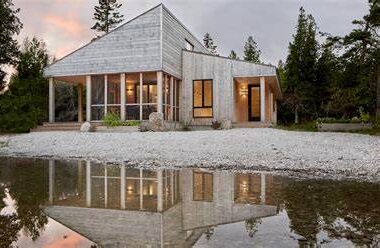Living in an off-grid home or cabin offers independence, sustainability, and a unique lifestyle, but it also comes with specific risks and insurance needs. Unlike traditional homes, off-grid properties may face challenges such as accessibility issues, lack of utility connections, and increased exposure to natural risks. Because of these factors, insurance for off-grid homes and cabins requires careful consideration and a tailored policy to protect both the property and its owners. This guide explores essential coverage options, factors that impact premiums, and tips for finding the right insurance for your off-grid property.
Table of Contents
ToggleUnderstanding the Insurance Needs of Off-Grid Homes
Unlike traditional homes connected to municipal services, off-grid homes are typically self-sufficient, relying on solar power, well water, and other independent systems. These properties are often located in rural or remote areas, making them more vulnerable to natural disasters like wildfires, floods, and storms, as well as potential delays in emergency response.
The main risks for off-grid properties include:
- Natural Disasters: Remote locations may face higher exposure to risks like wildfires or floods.
- Accessibility Issues: Limited access to emergency services can lead to greater damage if incidents occur.
- Alternative Energy Systems: Solar panels, wind turbines, and battery systems may require specialized coverage.
- Wildlife Encounters: Homes near forests or other natural settings may face risks from animals or pests.
Standard homeowners insurance may not fully address these risks, so it’s essential to look for specialized coverage that includes protection tailored to off-grid living.
Types of Coverage for Off-Grid Properties
There are several types of insurance coverage that are essential for protecting off-grid homes and cabins. These coverages can provide peace of mind by safeguarding the home’s structure, personal property, and liability.
Property and Dwelling Coverage
Property and dwelling coverage is the cornerstone of any home insurance policy, protecting the physical structure of the off-grid home or cabin. Given the unique construction and systems often present in off-grid homes, it’s important to check that the policy covers alternative energy systems and any specific building materials used in construction.
Key Property Coverage Considerations:
- Alternative Energy System Coverage: Ensures that solar panels, wind turbines, and battery backups are protected.
- Outbuilding Coverage: Many off-grid properties include additional structures like sheds, barns, or storage units that may need separate coverage.
- Rebuild Cost: Coverage should reflect the cost to rebuild in remote areas, where material and labor may be more expensive due to transportation and distance.
Liability Coverage
Liability coverage protects the homeowner against claims related to injuries or property damage that occur on the property. This can be particularly important in off-grid homes, where visitors may be unfamiliar with alternative systems or face unique environmental hazards.
Types of Liability Coverage:
- Personal Liability: Covers legal expenses, medical costs, and damages if someone is injured on your property.
- Premises Liability: Protects against claims related to accidents that might occur due to the property’s layout, such as outdoor hazards, unmarked paths, or alternative energy systems.
Personal Property Coverage
Personal property coverage protects belongings within the home, such as furniture, electronics, and other personal items. Off-grid homes may include specialized equipment like power inverters, water filtration systems, and tools, which may require specific coverage.
Special Considerations for Personal Property Coverage:
- Protection for Specialized Equipment: Ensure that unique items for off-grid living are covered.
- Replacement Cost Coverage: Choose replacement cost rather than actual cash value to cover the cost of buying new items in case of loss.
- Coverage for Firearms and Outdoor Gear: If you have firearms, fishing equipment, or other outdoor gear, make sure these items are included, especially if you live in a rural setting.
Factors That Influence Insurance Premiums for Off-Grid Homes
Insurance premiums for off-grid homes are influenced by various factors unique to remote properties. Understanding these factors can help you anticipate premium costs and tailor coverage to meet your needs.
- Property Location: Remote, rural locations tend to have higher premiums due to accessibility challenges and increased response times for emergency services.
- Natural Disaster Risks: Properties in areas prone to wildfires, floods, or hurricanes may face higher premiums or require additional coverage.
- Home Construction: Off-grid homes often use unconventional materials or designs, which may affect rebuilding costs and insurance rates.
- Security and Surveillance: Installing security systems, fire alarms, and motion detectors can reduce premiums, as they lower the risk of loss or damage.
- Self-Sufficiency Systems: Alternative energy systems (solar panels, battery backups) and independent water sources can impact premiums, especially if they are costly to replace or repair.
Challenges in Insuring Off-Grid Properties
Insuring off-grid properties can be challenging due to their remote locations, self-sufficient systems, and higher exposure to natural risks. Here are some common obstacles:
- Limited Policy Options: Many traditional insurers may not cover off-grid homes, so specialized policies or niche insurance providers may be necessary.
- High Deductibles and Premiums: Off-grid homes often come with higher deductibles and premiums, as they present higher risks to insurers.
- Exclusions for Certain Systems: Alternative energy systems or non-standard home designs may not be fully covered under standard policies, requiring additional endorsements.
- Maintenance Requirements: Many insurers require that certain systems (like heating and electrical) meet safety standards. Owners may need to demonstrate regular maintenance on solar or alternative systems to qualify for coverage.
If traditional insurers are not able to cover all aspects of an off-grid home, consider working with an insurance agent who has experience with rural and alternative properties, or explore insurance options specifically designed for cabins and remote properties.
Conclusion: Protecting Your Off-Grid Lifestyle
Investing in the right insurance policy for your off-grid home or cabin is essential to safeguarding your property, assets, and lifestyle. Given the unique risks and needs of remote living, take the time to review coverage options and choose a policy that addresses potential issues like natural disaster risks, alternative energy systems, and liability concerns. Although finding the right policy can be more challenging, working with an experienced agent and tailoring coverage to meet your specific needs will provide peace of mind and ensure you’re well-protected in your off-grid oasis.




